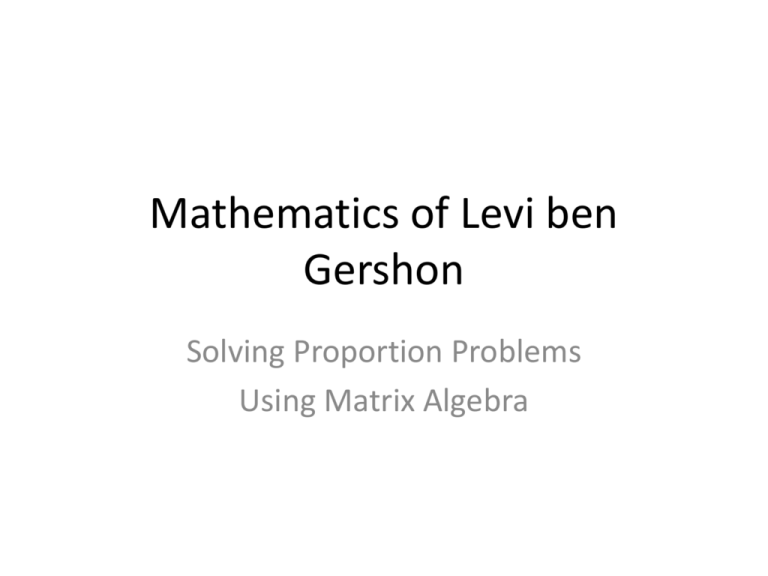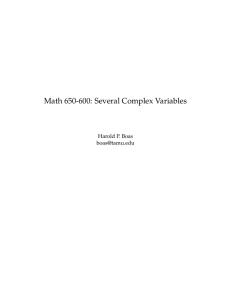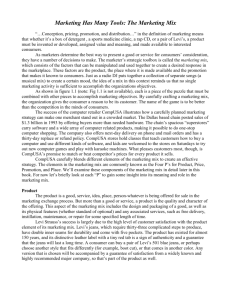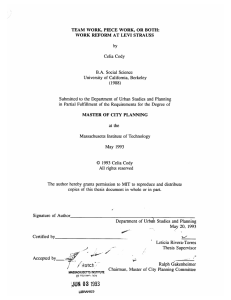Mathematics of Levi ben Gershon
advertisement

Mathematics of Levi ben Gershon Solving Proportion Problems Using Matrix Algebra Rabbi Levi ben Gershon 1288-1344 • • • • • Philosopher Biblical Exegete Inventor Scientist Mathematician Levi’s Mathematics • • • • Maaseh Hoshev (1321) Commentary on Euclid (1320’s) De Sinibus, Chordis et Arcubus (1342) De Numeris Harmonicis (1343) A harmonic number, as defined by Phillipe de Vitry (1291 – 1361), is a number of the form 2n3m. Levi proves that (1,2), (2,3), (3,4), (8,9) are the only pairs of such numbers that differ by 1. Levi’s Maaseh Hoshev • Theory: Over 60 theorems and proofs on arithmetic, algebra, sums, combinatorics, proportions. Early use of proof by mathematical induction • Practice: Algorithms for addition, subtraction, multiplication, division, square roots, cube roots, certain sums, proportion problems, permutations, and combinations. Proportions and Matrix Algebra Here is another easy way of finding numbers where the first plus one part or parts of the rest equals the other plus one part or parts of the rest… a c x y z w y x z w b d e g z x y w w x y z f h Levi’s Matrix Algebra Lemma x+y+z = 6 x+y+ w = 7 x+ z+w = 8 y+z+w = 9 Subtract each of the smaller from the largest: w – x = 3, z – x = 2, y – x = 1 Adding these gives (y+z+w) – 3x = 6, and therefore: 9 – 3x = 6, and x = 1. Example 5 1 x y z w y x z w 9 2 3 1 z x y w w x y z 7 3 Levi adds the constraint: = x+y+z+w - (9-5)(2-1)(7-3)(3-1) Levi Claims: y+z+w = 9×1×4×2 = 72 x+z+w = 4×2×4×2 = 64 x+y+w = 4×1×7×2 = 56 x+y+z = 4×1×4×3 = 48 Levi Proves his Claim x+y+z+w - (9-5)(2-1)(7-3)(3-1) = x+ (5/9)(y+z+w) y+z+w - (9-5)(2-1)(7-3)(3-1) = (5/9)(y+z+w) y+z+w - (5/9)(y+z+w) = (9-5)(2-1)(7-3)(3-1) (9-5)/9 (y+z+w) = (9-5)(2-1)(7-3)(3-1) y+z+w = 9(2-1)(7-3)(3-1) Example 5 1 x y z w y x z w 9 2 3 1 z x y w w x y z 7 3 y+z+w = 9×1×4×2 = 72 x+y+w = 4×1×7×2 = 56 x+z+w = 4×2×4×2 = 64 x+y+z = 4×1×4×3 = 48 By Levi’s lemma: w – x = 24 z – x = 16 x = 8, y = 16, z = 24, y–x=8 w = 32 5 1 x y z w y x z w 9 2 3 1 z x y w w x y z 7 3 x = 8, y = 16, z = 24, w = 32 • Any multiple of this solution is also a solution to the original problem. • Levi has machinery to avoid the “absurdity” of negative solutions. Conclusions • Levi implicitly considers matrix algebra in the context of under-determined systems of equations derived from problems on proportions. • Levi has ad-hoc methods to solve particular kinds of systems of n equations with n variables. • Levi has no general method akin to Gaussian elimination for solving an arbitrary system of equations. Jiuzhang suanshu (179 CE)







